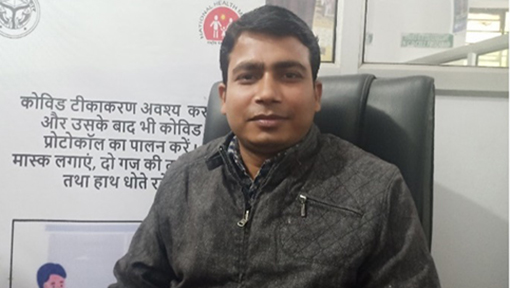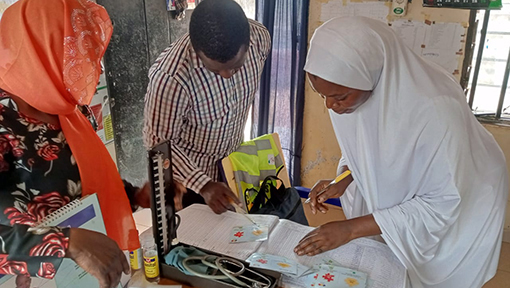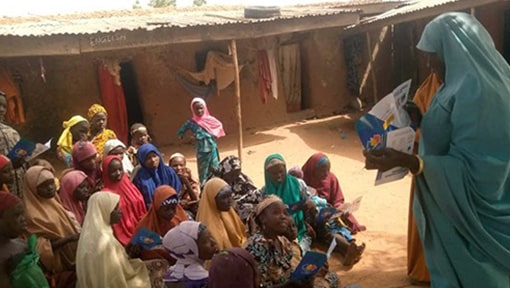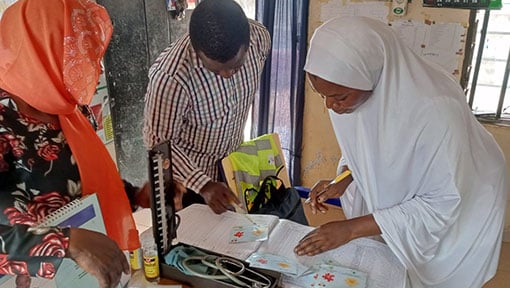In Their Own Words: The Impact of Coaching in Firozabad, a Newly Graduated City in India
Contributors: Mange Ram, Nitin Dwivedi, Samarendra Behera, Deepti Mathur and Parul Saxena

Praval Pratap Singh is a TCI master coach, as well as the District Urban Health Coordinator (DUHC) of the National Urban Health Mission (NUHM) in Firozabad.
TCI puts local governments in the driver’s seat to implement high-impact interventions (HIIs) within the public health system. This is achieved by creating a pool of “master coaches” at the city level through coaching and mentoring. The innovative concept of master coaches ensures the sustainability of not only the implementation of HIIs, but also their impact post- graduation from the city’s engagement with TCI. Since 2017, TCI partnered with the health department in Firozabad, Uttar Pradesh, through a shared vision to strengthen the urban family planning program of the city. Firozabad graduated from TCI in November 2021.
TCI recently sat down with master coach Praval Pratap Singh, the District Urban Health Coordinator (DUHC) of the National Urban Health Mission (NUHM) in Firozabad, to see what partnering with TCI has meant to him and how Firozabad is doing now that several months have passed since its graduation from TCI’s direct support.
I have seen development agencies bringing their own resources to drive change. On the contrary, TCI India since the onset adopted a systems approach and involved city officials to create ownership of evidence-based practices. It leveraged local government resources and focused on strengthening the capacities of government staff through a coaching model and empowered them to take the lead in executing HIA.
I learned many skills from TCI India to involve each stakeholder responsible to strengthen urban health and cascaded these skills to others, such as the FPLMIS [family planning logistics management information system] manager, HMIS [health management information system] person, accounts manager, community process manager, medical officer in-charge (MOICs), staff nurse, data entry operators, Auxiliary Nurse Midwife (ANMs), Accredited Social Health Activists (ASHAs) and Mahila Arogya Samiti (MAS) members, etc.
I have thoroughly observed how TCI team members coach, and likewise I applied these learnings to enable the coaching mechanism at the community and service delivery levels. For instance, I learned how to utilize data to identify bottlenecks and insights to improve the process and to make decisions for strengthening the system at both levels. I learned that if the decisions are captured with a proper action plan and responsibility matrix, then it creates accountability and tasks get accomplished in a timely manner.
I have realized the difference between classroom coaching and field-based practical coaching. I accompany ANMs and ASHAs during their household visits in their catchment area and coach them to complete the Urban Health Index Register (UHIR), providing informed choice to eligible couples, importance of good record keeping, the 2BY2 matrix which helps in prioritizing clients with potential family planning need. This has helped me to understand their challenges, skills and weaknesses, and accordingly, I am able to provide them supportive supervision in the field.
Similarly, I visit UPHCs to coach MOICs on the regularity of fixed-day static service (FDS)/Antral diwas and facility adolescent health days (F-AHDs), maintaining adequate family planning supplies through FPLMIS, assuring quality in services by organizing internal quality improvement team meetings, regular data reporting in HMIS, reviewing FDS data and performance of ANMs/ASHAs through the 2BY2 matrix data in ASHA and ANM meetings.
I have created a WhatsApp group of NUHM officials, UPHCs, ANMs and ASHAs. These groups are used to get real- and near- time information to provide timely guidance, share achievements and learnings, best practices and success stories. This has also boosted the motivation of my coachees.
Additionally, TCI India coached me on tapping potential review platforms for coaching. As a result, I use the MOIC review meetings, ASHA & ANM meetings and MAS meetings as coaching platforms, as it provides the opportunity to collectively review performance and provide common guidance. I have learned to be better organized. Now, prior to any meeting, I make a proper agenda and share it over the WhatsApp group. I have inculcated the habit of noting down topics for coaching from MOICs to MAS members.
With regards to my coachees, that is, the frontline workers and the UPHCs staff, I would say they are well-coached and are playing their roles and responsibilities efficiently in providing informed choice and method mix services to the clients, including serving adolescents. The biggest change that I have noticed is of the increase in demand for family planning among the community as evidenced in the family planning service uptake data in the HMIS, where Firozabad has recorded a 565% increase in annual client volume at UPHCs comparing October 2017 (1,650) to February 2022 (10,970).

Annual Client Volume of Firozabad UPHCs from October 2017 to February 2022 (Source: HMIS).
My coaching is not limited to Firozabad. At a divisional level meeting in Agra, I have coached officials of other districts of the division on the ‘City Health Plan’ approach. Besides this, when TCI India expanded intervention in five new cities of Uttar Pradesh, I coached officials of the new scale-up cities on key HIAs through the platform of Mini University.
TCI India’s HIA tools have introduced me to simple yet systematic way of accelerating the processes for strengthening urban family planning program. The learnings I have received from TCI India are for lifetime, and I will use these learnings in other programs as well.”






